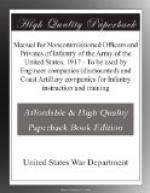SECTION 3. LOYALTY.
But even with implicit obedience you may yet fail to measure up to that high standard of duty which is at once the pride and glory of every true soldier. Not until you carry out the desires and wishes of your superiors in a hearty, willing, and cheerful manner are you meeting all the requirements of your profession. For an order is but the will of your superior, however it may be expressed. Loyalty means that you are for your organization and its officers and noncommissioned officers—not against them; that you always extend your most earnest and hearty support to those in authority. No soldier is a loyal soldier who is a knocker or a grumbler or a shirker. Just one man of this class in a company breeds discontent and dissatisfaction among many others. You should, therefore, not only guard against doing such things yourself but should discourage such actions among any of your comrades.
SECTION 4. DISCIPLINE.
“1. All persons in the military service are required to obey strictly and to execute promptly the lawful orders of their superiors.
“2. Military authority will be exercised with firmness, kindness, and justice. Punishments must conform to law and follow offenses as promptly as circumstances will permit.
“3. Superiors are forbidden to injure those under their authority by tyrannical or capricious conduct or by abusive language. While maintaining discipline and the thorough and prompt performance of military duty, all officers, in dealing with enlisted men, will bear in mind the absolute necessity of so treating them as to preserve their self-respect. Officers will keep in as close touch as possible with the men under their command and will strive to build up such relations of confidence and sympathy as will insure the free approach of their men to them for counsel and assistance. This relationship may be gained and maintained without relaxation of the bonds of discipline and with great benefit to the service as a whole.
“4. Courtesy among military men is indispensable to discipline; respect to superiors will not be confined to obedience on duty, but will be extended on all occasions.
“5. Deliberations or discussions among military men conveying praise or censure, or any mark of approbation, toward others in the military service, and all publications relating to private or personal transactions between officers are prohibited. Efforts to influence legislation affecting the Army or to procure personal favor or consideration should never be made except through regular military channels; the adoption of any other method by any officer or enlisted man will be noted in the military record of those concerned,” (ArmyRegulations_.)




